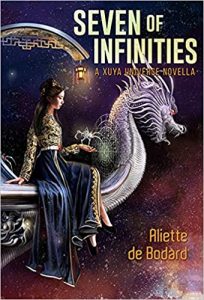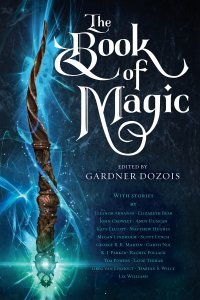Gary K. Wolfe Reviews Seven of Infinities by Aliette de Bodard
 Seven of Infinities, Aliette de Bodard (Subterranean 978-1-59606-976-3; $40.00, 176pp, hc) October 2020.
Seven of Infinities, Aliette de Bodard (Subterranean 978-1-59606-976-3; $40.00, 176pp, hc) October 2020.
I’ve always been impressed by the ways in which different genres can use each other, especially in the hands of an adroit writer who is also an adroit reader. Alix E. Harrow is one example and Aliette de Bodard, who adapted “Beauty and the Beast” into a far-future post colonialist fable with In the Vanishers’ Palace and set an ingenious Holmes-and- Watson pastiche in her alternate-future Xuya universe in The Tea Master and the Detective, is another. Seven of Infinities is a mystery/romance situated in the same remote cluster of orbital habitats, the Scattered Pearls Belt, as The Tea Master and the Detective. Except for that setting and the fact that a couple of major characters are mindships and another a constructed personality used as a memory implant, the events of the tale wouldn’t be much out of place in a classical whodunit. A poor scholar tutoring a wealthier student is visiting with a friend of hers from the local poetry club, when the student interrupts to announce that another visitor has arrived, but was found dead when the student went to greet her. The poetry-club friend, taking a sudden interest in the case, uses some shady connections to discover that the dead woman may have died looking for something, and that the house where all this takes place was designed by an architect with a penchant for puzzles. This leads to the discovery of a hidden safe containing three unremarkable objects, one of which is a clue that in turn leads them to a hazardous outing to a remote ruin. Corpses are discovered, secret backstories unveiled, fortunes hidden, a client foolishly tricked into going alone into danger, etc.
The role of the detective in this case is assumed by the mindship The Wild Orchid in Sunless Woods, though it might as well be called The Lord Peter Wimsey. Actually, Sunless Woods identifies as female and has a considerably sketchier background than Wimsey, but her sense of compassion and even romance locates her more in Sayers territory than that of the chilly, arrogant Holmesian of Tea Master. “I would like to involve myself in this,” she politely announces, clearly attracted to and protective of the teacher, Vân. The investigation inevitably places Vân in danger, and at one point they even discover another apparent murder victim, a gruesome frozen corpse in the ruined hulk of a dead mindship (reminiscent a bit of the frozen corpse that serves as a plot point in Tea Master). More important, though, is that the case calls up memories from Sunless Woods‘s own past – and may even be linked to those memories. For her part, Vân has her own guilty secrets, one of which has to do with an illegally manufactured “ancestor” who serves as her “mem-implant,” a crucial resource for a tutor. The other character endangered by all these discoveries is Vân’s innocent but strong-willed student, Uyên, who gets left behind for large swatches of the plot, but who has her own very satisfying heroic moment late in the tale.
While Seven of Infinities is a perfectly satisfactory mystery, with ingratiating characters and clever puzzles, its main appeal comes from de Bodard’s seamless weaving together of three wildly diverse frames of reference: the structure of a romantic mystery, the far-future space opera-like setting, and the culture of formality and tradition derived from its Vietnamese and Chinese ancestry (the title, for example, refers to a tile from an ancient gaming tradition). In SF terms, de Bodard’s Xuya Universe – a far future descended from an alternate past – is a pretty impressive imaginative construct by itself, but as she demonstrates with stories like this, it’s also a way of rethinking and sometimes reinventing familiar formulas, of defamiliarizing the familiar through the lens of different cultures and histories. But mostly, it’s a lot of fun.
Gary K. Wolfe is Emeritus Professor of Humanities at Roosevelt University and a reviewer for Locus magazine since 1991. His reviews have been collected in Soundings (BSFA Award 2006; Hugo nominee), Bearings (Hugo nominee 2011), and Sightings (2011), and his Evaporating Genres: Essays on Fantastic Literature (Wesleyan) received the Locus Award in 2012. Earlier books include The Known and the Unknown: The Iconography of Science Fiction (Eaton Award, 1981), Harlan Ellison: The Edge of Forever (with Ellen Weil, 2002), and David Lindsay (1982). For the Library of America, he edited American Science Fiction: Nine Classic Novels of the 1950s in 2012, with a similar set for the 1960s forthcoming. He has received the Pilgrim Award from the Science Fiction Research Association, the Distinguished Scholarship Award from the International Association for the Fantastic in the Arts, and a Special World Fantasy Award for criticism. His 24-lecture series How Great Science Fiction Works appeared from The Great Courses in 2016. He has received six Hugo nominations, two for his reviews collections and four for The Coode Street Podcast, which he has co-hosted with Jonathan Strahan for more than 300 episodes. He lives in Chicago.
This review and more like it in the October 2020 issue of Locus.
 While you are here, please take a moment to support Locus with a one-time or recurring donation. We rely on reader donations to keep the magazine and site going, and would like to keep the site paywall free, but WE NEED YOUR FINANCIAL SUPPORT to continue quality coverage of the science fiction and fantasy field.
While you are here, please take a moment to support Locus with a one-time or recurring donation. We rely on reader donations to keep the magazine and site going, and would like to keep the site paywall free, but WE NEED YOUR FINANCIAL SUPPORT to continue quality coverage of the science fiction and fantasy field.
©Locus Magazine. Copyrighted material may not be republished without permission of LSFF.







